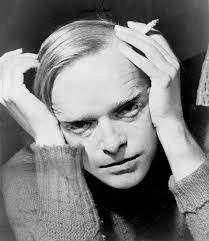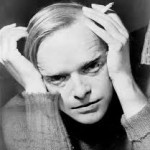Truman Capote’s Unfinished Novel

Truman Capote’s unfinished novel Answered Prayers is an unfinished novel by American author Truman Capote, published posthumously in 1986 in England and in 1987 in the United States.The title is in reference to a quote by Saint Teresa of Ávila: “Answered prayers cause more tears than those that remain unanswered”…Wikipedia
Truman Capote’s Unfinished Novel
According to Joseph M. Fox’s editor’s note to the 1987 edition, Capote signed the initial contract for the novel—envisioned as being a contemporary American analog to Marcel Proust’s In Search of Lost Time—on January 5, 1966 with Random House. This agreement provided a $25,000 advance with a stipulated delivery date of January 1, 1968.
Distracted by the unprecedented success of his “nonfiction novel” In Cold Blood amid the gestation of the Black and White Ball (a party thrown by Capote in honor of Katharine Graham at the Plaza Hotel in November 1966), various television projects, short pieces and increasing personal demons, Capote missed his 1968 deadline. In July 1969, the superannuated 1966 contract was renegotiated, granting a “substantially larger” $750,000 advance in exchange for a trilogy to be delivered in January 1973. The delivery date was further delayed to January 1974 and then September 1977. A final agreement in early 1980 would have yielded Capote $1,000,000 to have been paid only if he submitted the manuscript by March 1, 1981. This final deadline was not kept.[4]
In May 1971, on The Dick Cavett Show, Capote referred to the book as his “posthumous novel”, explaining, “either I’m going to kill it, or it’s going to kill me”.The book is a somewhat sordid tale of the mixing of high and low social classes, drawn from his experiences as best friend and confidant to the most prominent female socialites of the era and their husbands.
The first chapter of Answered Prayers, “Unspoiled Monsters”, chronicles the “picaresque” exploits of P.B. Jones, a young writer (enmeshed in the process of writing a novel, Answered Prayers) and “bisexual hustler” who “beds men and women alike if they can further his literary career” in the 1940s New York literary milieu; accordingly, both Katherine Anne Porter and Tennessee Williams are depicted in a vituperative light.[3]
Jones (who later appears as the main interlocutor in “La Cote Basque”) is believed to be a composite of Capote, Perry Smith from In Cold Blood, and Capote’s late friend Denham Fouts. The eponymous protagonist of the comparatively obfuscatory “Kate McCloud” (and the ostensible heroine of the novel) was inspired by Mona von Bismarck, the eldest of Capote’s society friends.
read entire article

